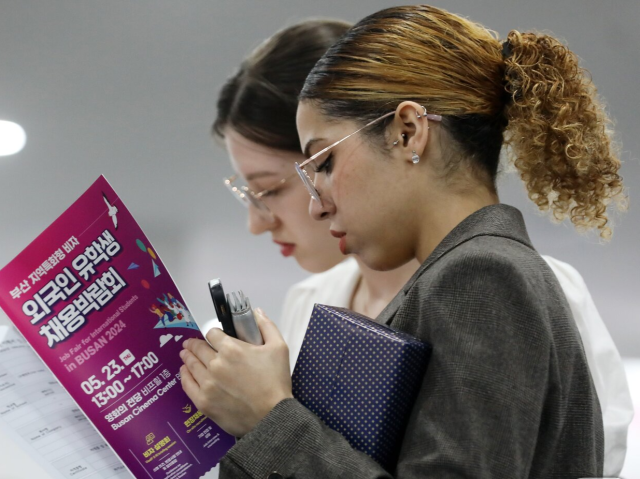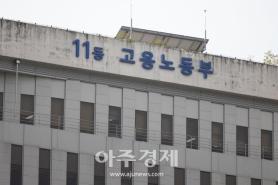
International students look at booklets at a job fair in Busan, in this file photo from May last year. Courtesy of Busan Metropolitan City
SEOUL, October 29 (AJP) - Amid a global race to attract top talent, South Korea is opening its doors to international professionals through a series of new policies, especially those from Asian countries where South Korean companies already have production networks and academic partnerships.
Internship program for foreign talent
Earlier this week, the Ministry of Justice introduced the so-called "K-Trainee" program, which is designed to help South Korean companies find and foster potential foreign talent before formally hiring them.
The program, set to be piloted for two years, will focus on nine Asian countries - China, India, Indonesia, Japan, Malaysia, the Philippines, Singapore, Thailand, and Viet Nam - where South Korean companies have their branches, factories, and other facilities.
Those eligible include students in their third year or higher including those pursuing master's or doctoral degrees who are enrolled at universities with training partnerships with South Korean companies in their home countries, as well as professionals working at overseas subsidiaries of South Korean companies in 77 occupations eligible for E-7-1 and E-7-2 visas.
They will be invited to take part in a professional internship program in South Korea for a certain period, helping them become familiar with the local working environment.
The ministry said that through this program, businesses can quickly retain "reliable" foreign workers to meet their needs, while foreign talent can enhance their practical skills and have the opportunity to build their careers here.
At the same time, requirements for the issuance of a D-10 visa, which allows foreign graduates to engage in professional internships, were eased to extend the maximum length of stay from two years to three years, both for those in South Korea and abroad.
For applicants from the world's top 200 universities or the top 1,000 universities for engineering majors in the aforementioned Asian countries, Korean language proficiency requirements and visa procedures are either reduced or waived.
Justice Minister Jeong Seong-ho said, "This internship program will enable companies to quickly find the talent they need, while top foreign jobseekers can enhance their practical skills and grow into a driving force for future growth here."
Program for high-skilled foreign workers
Another special visa program for top professionals, called the "K-STAR Visa Track," was introduced early last month to attract talent in the STEM fields (Science, Technology, Engineering, and Mathematics).
The program allows highly qualified foreign experts, researchers, and professors in key fields such as artificial intelligence (AI), semiconductors, next-generation batteries, and biotechnology to receive long-term visas as well as several incentives to support their settlement here.
Its fast-track visa process enables outstanding scientists and experts to remain in South Korea after just three years of work, instead of the normally required five years.
South Korea aims to attract at least 400 such STEM professionals each year through this program.
To facilitate this, research institutes, universities, and conglomerates such as Samsung Electronics, SK hynix, and Hyundai Motor are participating.
Since March this year, the Seoul Metropolitan Government has also been running an online platform to connect international professionals and provide useful information on housing, daily life, and other administrative procedures, in cooperation with relevant companies.
Global race to attract top talent
After the U.S. raised H-1B visa fees to a whopping $100,000, countries such as China, Japan, Singapore, and the U.K. have moved quickly to either launch or strengthen policies to retain top-tier professionals.
Japan has maintained a similar program since 2012, allowing applicants to apply for permanent residence after just one year if they reach a certain amount of points. However, many restrictions still exist due to language and cultural barriers.
Singapore has a program called the "Global Investor Programme (GIP)" for international investors. Although it is not exactly aimed at recruiting professional workers, it demonstrates a strategy to attract both capital and top talent.
Singapore, where English is widely spoken, makes it easier to attract talented workers than many other Asian countries, although its market size and industrial base are somewhat smaller than South Korea’s in terms of manufacturing.
Since 2009, China has been operating a program dubbed the "Thousand Talents Plan," an initiative that aims to attract foreign scientists by providing various benefits including funding for research.
In 2013, China introduced the "R visa" to attract top talent, and recently the State Council announced plans to issue a "K visa" for young foreign scientists and technical experts.
The "K visa" targets young foreigners who have graduated from renowned universities or research institutions, both at home and abroad, and hold a bachelor's degree or higher in STEM (science, technology, engineering, and mathematics) fields. Applicants must meet the conditions set by the Chinese government and submit the required documents.
"K visa" holders will be able to engage not only in the fields of education, culture, science, and technology after entry, but also in related startups and business activities.
Compared to these countries, South Korea is pursuing a two-tier strategy: the K-Trainee program to attract young skilled foreign talent who are in the learning stage or have just begun working, and the K-STAR Visa to invite highly qualified experts ready to contribute immediately to strategic industries.
According to a study conducted by the Korea Chamber of Commerce and Industry, together with researchers led by Professor Kim Duk-pa of Korea University and released in August, attracting 1 million skilled foreign workers could boost South Korea's GDP by 6 percent, equivalent to roughly 145 trillion won ($104.3 billion).
"When highly skilled foreign experts with specialized knowledge come to South Korea, it's not just about population growth. It also boosts consumption and can maximize the economic ripple effect by improving labor productivity, enhancing industrial competitiveness, and promoting the industrial structure," said Kim.
Copyright ⓒ Aju Press All rights reserved.



